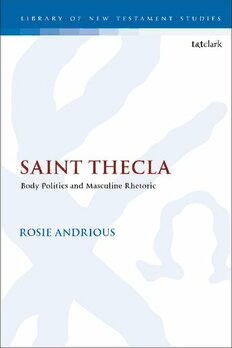
Saint Thecla: Body Politics and Masculine Rhetoric PDF
247 Pages·2020·17.289 MB·English
Most books are stored in the elastic cloud where traffic is expensive. For this reason, we have a limit on daily download.
Preview Saint Thecla: Body Politics and Masculine Rhetoric
Description:
This study questions the prevailing ‘female empowering’ interpretation of Thecla in the Acts of Paul and Thecla. Andrious examines the way that Thecla is voyeuristically paraded and subjected to a kind of sado-erotic torture, and shows how this clashes with any notion that she is presented as a positive role-model for a woman.Rather, Andrious sets this discourse about female ‘self-control’ and ‘chastity’ over against the wider narrative of Christian men struggling against the invasive violence of Rome and suggests that the victimized, voyeuristic female representation of Thecla has very little to do with women and is, rather, a complex literary text that represents a power struggle between men. The ideological function of Thecla is therefore, as a constructed body that transcends its ‘natural’ feminine weakness. This study thus provides an original interpretative framework for understanding Thelca’s representation and suggests a completely new way of seeing her.
See more
The list of books you might like
Most books are stored in the elastic cloud where traffic is expensive. For this reason, we have a limit on daily download.
